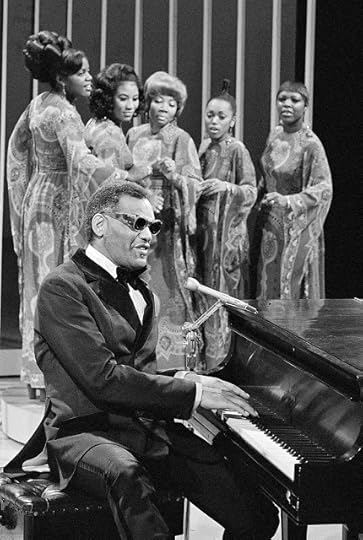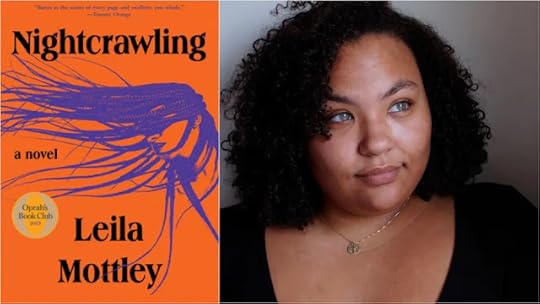Mark Anthony Neal's Blog, page 52
July 20, 2022
Hip-Hop Heresies: Queer Aesthetics in New York City | Shanté Paradigm Smalls in Conversation with Elliott Powell

'Popular Music Books in Process presents Shanté Paradigm Smalls in conversation with Elliott Powell. Smalls is the author of Hip-Hop Heresies: Queer Aesthetics in New York City (NYU Press), which centers New York City as a space where vibrant queer, Black, and hip hop worlds collide and bond in dance clubs, schools, roller rinks, basketball courts, subways, and movie houses. Using this cultural nexus as the stage, Smalls attends to the ways that hip hop cultural production in New York City from the 1970s through the early twenty-first century produced film, visual art, and music that offer queer articulations of race, gender, and sexuality.'
Keke Palmer's WIRED Autocomplete Interview

'Nope star Keke Palmer takes the WIRED Autocomplete Interview and answers the Internet's most searched questions about herself. What was Keke Palmer's first movie role? How was Keke discovered? What is her actual name? Is she in an Old Navy commercial? Who does she play in Big Mouth? What are her best songs? Keke answers all these questions and much more!'
July 19, 2022
Ray Charles’ 'Message for the People' and the Promise of Tangerine Records by Mark Anthony Neal

Ray Charles’ Message for the People and the Promise of Tangerine Records
by Mark Anthony Neal | @NewBlackMan | NewBlackMan (in Exile)
For a generation or two of Americans, at least, their most concrete connection to Ray Charles’ music are not the songs he recorded in the 1950s that forged a path forward for the “Sounds of Blackness” in the mainstream public. Rather it is his soulful, and ultimately definitive, rendition of “America the Beautiful”, the patriotic hymn based on a poem from Katharine Lee Bates. The song was included on the album, Message from the People (1972), an album generally regarded as an afterthought in the pantheon of Charles’ music, but from the vantage of 50 years resonates as an important contribution to not only his legacy, but the music of resistance recorded by many of Charles’ peers in the era.
Ray Charles was more than twenty-years into his career when he released Message from the People. A conservative view of his music up to that point would concede that he had an impact on the sound of American popular music. To be sure Charles was not alone as an innovator, at least among his Black peers, where Chuck Berry, Mahalia Jackson, Willie Dixon, Muddy Waters, Little Richard, Sister Rosetta Tharpe, and even Ike Turner could make similar claims – if we are to consider their collective influence throughout the end of the 20th century. But it was Charles’ mash of Saturday night and Sunday morning idioms that became the soundtrack of Black resistance, on the one hand, and the ambient background to liberal moderation on the other. Charles became a legitimate icon in the process, one that would rate an Oscar-worthy biopic thirty years-plus after Message from the People was recorded.
There’s a price to pay for being adored across the color-line, and Charles music’ and his politics were showing some wear in 1972. New York Times critic Don Heckman suggested as much in his review of Message from the People (nestled on the page between a review of a posthumous Janis Joplin album and one by Dan Hicks and His Hot Licks): “The Miracle of Ray Charles’ music is his constant ability to survive his material…but this is not one of his more memorable outings.” It had been more than a decade since Charles left Atlantic Records and signed his groundbreaking contract with ABC-Paramount, where he became the first major recording artist to negotiate ownership of his master recordings. It was with ABC-Paramount that Charles experienced the most successful commercial period of his career.
Free from the controls of Atlantic, Charles doubled down on the music he heard in his head, a mix of the Blues, Gospel, Rockabilly, Rhythm & Blues and Country (and Western) with flourishes of Big Band Jazz. With songs like “Georgia on My Mind”, “Hit the Road Jack” and “I Can't Stop Loving You” – and which topped the US Pop Charts between 1960 and 1962 – Charles became a certified crossover Pop star. It was one the strength of this success that Charles negotiated with ABC-Paramount to launch his own boutique label, Tangerine Records, which began operation in 1962. In many ways, Message from the People, is the culmination of the vision that Charles intended for Tangerine Records.
In the early days of the label, Tangerine Records released recordings from legendary Charles influences like Louis Jordan (ground-zero for post-World War II, Black crossover) and overlooked legend Percy Mayfield, who wrote and first recorded “Hit the Road Jack”, as well as a handful of Ike & Tina Turner singles. Perhaps the most spectacular album released in the early years of the label was Jimmy Scott’s Falling in Love Is Wonderful, which few heard at the time as the album was pulled because of Scott’s career-long legal struggles with his former label Savoy Records and its founder Herman Lubinsky. With the label struggling to get a foothold in the marketplace, Charles renegotiated his contractual obligations in 1966 so that he essentially became a Tangerine artist, with his records bearing both the Tangerine and ABC-Paramount imprint. The label’s first big hit not surprisingly was Charles’s “Let’s Go Get Stoned”, penned by the then unknown songwriting team of Jo Armstead, Valerie Simpson, and Nick Ashford. The song was one of Charles’ most successful “Black” songs, as Tangerine gave him the flexibility to release singles directed towards Black audiences – "If It Wasn't for Bad Luck" (with Jimmy Lewis) and the largely instrumental “Booty Butt” immediately come to mind – particularly those Black listeners who weren’t yet following James Brown, Sly Stone, and Norman Whitfield onto funk street.
Charles’s strategy of targeting singles to Black radio allowed him to record albums that resonated with his broader audience base. The year prior to Message from the People,Charles released the introspective Volcanic Action of My Soul, which at that point was one of his more commercially successful albums in recent years. Alongside covers of Lennon and McCartney, George Harrison and Jimmy Webb (because who wasn’t covering Jimmy Webb at that time), there were eclectic choices like “All I Ever Need is You” (joined by Glen Campbell), which later served as hits for Sonny & Cher and Kenny Rogers and Dottie West, and the Country classic, “The Three Bells.”
There’s no doubt that some of the eclecticism of Volcanic Action of My Soul informed the musical choices on Message from the People, like covering John Denver’s breakthrough “Country Home, Take Me Home” and even “America the Beautiful”, which reviewer Heckman described as a “maudlin patriotic” song. Additionally, Charles was not recording in the midst a political vacuum; his whole career to that point aligned with the Black Freedom Movement. In 1971, though there was cohort of albums released that might be thought of as “Black Music’s Revolt” – sonically and politically – including Marvin Gaye’s What’s Going On, Isaac Hayes’ Shaft soundtrack, Sly & the Family Stone’s There’s a Riot Goin On, and singles like Freda Payne’s “Bring the Boys Home” and Gil Scott-Heron’s “The Revolution Will Not Be Televised.” Indeed, Charles experienced some of this energy, sharing the stage with Aretha Franklin in March of 1971 on the third night of her three-night stand at the Fillmore West, released as Live at Fillmore West. As Charles told David Ritz in Brother Ray, his choice of songs of Message from the People was akin to saying “listen, you need to clean up some of this shit, America, but I still Love you.”
That energy might explain the lead single from Message from the People, which finds Charles’ bordering on kitschy with his rendition of Melanie’s "What Have They Done to My Song, Ma.” Charles’s addition of “Look” in the title of his version, served as a reminder and admonishment for the years of exploitation of Black musicians and their art, the very conditions that led to Charles’ desire to control his catalog more than a decade earlier. In his closing ad-lib, Charles sings “Lord knows I don't care what they done to my song…The main thing, mama, what they trying to do to me / You see, well they stole everything I had, mama / And they made a million with it and you know that hurts.” In retrospect, it’s not surprising that radio stations flipped the record over and started playing the B-side, “America the Beautiful”, which is also the closing track on the album. Heightening the significance of the album, Charles brought in longtime friend Quincy Jones as producer, who utilized an accomplished group of session musicians that included Freddie Hubbard, Hubert Laws, and Eric Gale (aka the CTI all-stars), as well as Chuck Rainey and Grady Tate.
Not so ironically,Message from the People opens with another anthem, The Brothers Johnson’s (James Weldon and J. Rosamond) “Lift Ev’ry Voice and Sing”, as part of an opening suite that includes a bluesy, robust rendition of Stevie Wonder’s “Heaven Help Us All,” and a surprising and thoughtful version “Seems Like I Gotta Do Wrong”, from a then little known group called The Whispers. Taken in together, the opening suite was an example of the gravitas of Charles to cosign the genius – in the absence of mainstream affirmation – of overlooked Black musicians.
The album’s most potent song was “Hey Mister”, written by Betty Lapcevic (a possible pseudonym) which features an outright challenge to elected officials around the issues of hunger and poverty. Lyrics like “The Poor people know that they can't impeach you / They just hoping that their cries will reach you” and “Foreign aid is well and good /But why don't you give some of that money to the neighborhood / Can't keep living down here in mud / And I know you're sick and tired of looking at blood” were the most politically explicit of Charles’ career. Indeed the song was played aloud during the Joint Hearings Before the Special Subcommittee on Human Resources and the Subcommittee on Aging, chaired by then Senator Alan Cranston in June of 1972.
There was a duality with Message from the People; Charles’ desire to reclaim a younger, increasingly militant Black audience, and to resuscitate a waning career as a top-tier recording artist. Like many of his peers, he would find his commercial afterlife on the road, singing the songs that made him famous to aging crowds for the last thirty years of his life. There would be occasional breakthroughs: 1984’s Friendship, which topped the Country Music charts and found him duetting with the likes of Willie Nelson, Johnny Cash, and Hank Williams, Jr., the son of his early contemporaries; his duet with Chaka Khan on Quincy Jones’ cover of The Brothers Johnson’s “I’ll Be Good To You,” which topped the R&B charts in 1990; and his final studio offering Genius Love Company, a duet album released posthumously a year after his death.
Perhaps sensing the inevitable, Charles shuttered Tangerine a year after Message from the People, and ending his relationship with ABC-Paramount, recording with a half-dozen companies over the rest of his career, including a brief return to Atlantic. Tangerine’s catalog never rivaled that of Charles' early days with Atlantic of his peak at ABC-Paramount, but the label was a measure of the level of control that he sought for himself throughout his recording career. As an artist whose catalog has been exhaustively curated, many of Charles’s Tangerine albums have long been out-of-print or available on digital streaming services. That changed with the recent release of a 50th anniversary edition of Message from the People and the previously unavailable Live in Stockholm 1972. The releases are a reminder of the faith that Ray Charles had in the power of his music and its timelessness; faith that he was willing to stake his own reputation and financial resources on.
***
Mark Anthony Neal is the James B. Duke Distinguished Professor of African & African American Studies at Duke University and the author of several books including the recent Black Ephemera: The Crisis and Challenge of the Musical Archive (NYU Press).
@font-face {font-family:Helvetica; panose-1:0 0 0 0 0 0 0 0 0 0; mso-font-charset:0; mso-generic-font-family:auto; mso-font-pitch:variable; mso-font-signature:-536870145 1342208091 0 0 415 0;}@font-face {font-family:"Cambria Math"; panose-1:2 4 5 3 5 4 6 3 2 4; mso-font-charset:0; mso-generic-font-family:roman; mso-font-pitch:variable; mso-font-signature:3 0 0 0 1 0;}@font-face {font-family:Calibri; panose-1:2 15 5 2 2 2 4 3 2 4; mso-font-charset:0; mso-generic-font-family:swiss; mso-font-pitch:variable; mso-font-signature:-536859905 -1073732485 9 0 511 0;}p.MsoNormal, li.MsoNormal, div.MsoNormal {mso-style-unhide:no; mso-style-qformat:yes; mso-style-parent:""; margin:0in; mso-pagination:widow-orphan; font-size:12.0pt; font-family:"Calibri",sans-serif; mso-ascii-font-family:Calibri; mso-ascii-theme-font:minor-latin; mso-fareast-font-family:Calibri; mso-fareast-theme-font:minor-latin; mso-hansi-font-family:Calibri; mso-hansi-theme-font:minor-latin; mso-bidi-font-family:"Times New Roman"; mso-bidi-theme-font:minor-bidi;}.MsoChpDefault {mso-style-type:export-only; mso-default-props:yes; font-family:"Calibri",sans-serif; mso-ascii-font-family:Calibri; mso-ascii-theme-font:minor-latin; mso-fareast-font-family:Calibri; mso-fareast-theme-font:minor-latin; mso-hansi-font-family:Calibri; mso-hansi-theme-font:minor-latin; mso-bidi-font-family:"Times New Roman"; mso-bidi-theme-font:minor-bidi;}div.WordSection1 {page:WordSection1;}
@font-face {font-family:Helvetica; panose-1:0 0 0 0 0 0 0 0 0 0; mso-font-charset:0; mso-generic-font-family:auto; mso-font-pitch:variable; mso-font-signature:-536870145 1342208091 0 0 415 0;}@font-face {font-family:"Cambria Math"; panose-1:2 4 5 3 5 4 6 3 2 4; mso-font-charset:0; mso-generic-font-family:roman; mso-font-pitch:variable; mso-font-signature:3 0 0 0 1 0;}@font-face {font-family:Calibri; panose-1:2 15 5 2 2 2 4 3 2 4; mso-font-charset:0; mso-generic-font-family:swiss; mso-font-pitch:variable; mso-font-signature:-536859905 -1073732485 9 0 511 0;}p.MsoNormal, li.MsoNormal, div.MsoNormal {mso-style-unhide:no; mso-style-qformat:yes; mso-style-parent:""; margin:0in; mso-pagination:widow-orphan; font-size:12.0pt; font-family:"Calibri",sans-serif; mso-ascii-font-family:Calibri; mso-ascii-theme-font:minor-latin; mso-fareast-font-family:Calibri; mso-fareast-theme-font:minor-latin; mso-hansi-font-family:Calibri; mso-hansi-theme-font:minor-latin; mso-bidi-font-family:"Times New Roman"; mso-bidi-theme-font:minor-bidi;}.MsoChpDefault {mso-style-type:export-only; mso-default-props:yes; font-family:"Calibri",sans-serif; mso-ascii-font-family:Calibri; mso-ascii-theme-font:minor-latin; mso-fareast-font-family:Calibri; mso-fareast-theme-font:minor-latin; mso-hansi-font-family:Calibri; mso-hansi-theme-font:minor-latin; mso-bidi-font-family:"Times New Roman"; mso-bidi-theme-font:minor-bidi;}div.WordSection1 {page:WordSection1;}
July 18, 2022
The Limits with Jay Williams: Meet the mogul behind the rise of Mariah Carey, Will Smith and Nas

'Host Jay Williams talks to Steve Stoute, a music executive responsible for shaping the careers of the biggest stars in recent memory. Nas, Mariah Carey, Will Smith — Steve Stoute's résumé rivals the best of the best. He spent the '90s molding talent at Interscope Records alongside Jimmy Iovine. But in 2004, when he felt his vision for marketing wasn't being realized, he left Interscope and founded his own firm, Translation. The company now has a net worth of over 30 million dollars with clients like HBO, Nike and Beats by Dre, and it sits directly at the intersection of advertising and music. Now, Steve's attempting to shake up the music industry once again with his company UnitedMasters, which gives artists the ability to distribute their music across platforms without signing to a label.'
'The Captain' Celebrates the Career of Derek Jeter

'Yankees shortstop and Hall of Famer Derek Jeter was known as "The Captain," and "Mr. November," for his leadership on the field and in the clubhouse, and for his clutch hits in big moments. Notoriously tight-lipped with the media throughout his career, Jeter managed to remain one of the most beloved Yankees of all time. A new seven-part ESPN docuseries called, "he Captain tells the story of his career, from his upbringing, his electric early years with the Yankees, his strained relationship with former friend and teammate Alex Rodriguez, and the career changing injury that affected his game forever. Director Randy Wilkins joins us to discuss the series, and getting Jeter to be candid on camera.'
Author Leila Mottley and Her New Book 'Nightcrawling

'Oakland’s 2018 Youth Poet Laureate Leila Mottley joins us to discuss her debut novel, Nightcrawling. The work, already an Oprah’s Book Club Pick, has been described as “dazzling” and Leila has been named a '
Bullseye with Jesse Thorn: Howard Bryant on baseball legend Rickey Henderson

'Howard Bryant is an author, sports correspondent for NPR's Weekend Edition Saturday and a senior writer for ESPN. In his new book, Rickey: The Life and Legend of an American Original, he looks at how Rickey Henderson's Oakland roots helped shape him into one of the greatest to ever play baseball. In telling the story of Rickey, Bryant also tells a story about the history of baseball: how players began to realize their true monetary value, and how Black players came to assert themselves as stars in the game.'
July 17, 2022
Chicago Midwife Hopes South Side Birth Center Will Help Close Maternal Health Gap

'Jeanine Valrie-Logan had 12 clients scheduled during a recent evening shift at The Birth Center at PCC in Berwyn, a Chicago suburb.The first client is a woman nearing her due date, and her baby girl has been kicking a lot. Later it’s a young couple who say they’re feeling tired and stressed caring for their newborn daughter. And then a pregnant woman with questions about treating her gestational diabetes. Valrie-Logan is a certified nurse midwife, but not a doctor, so she has to refer people to an affiliated hospital nearby if there are complications. But for low-risk pregnancies, birth centers like PCC are designed to give people an option in between going to a hospital and giving birth at home. They're usually more affordable than a hospital, too.'
J'Nai Bridges: Tiny Desk (Home) Concert

'Mezzo-soprano J'Nai Bridges is a rising star who recently won a Grammy Award and other accolades too long to list here. We're glad she accepted our invitation to record this Tiny Desk (home) concert, which features Damien Sneed on piano, Nolan Nwachukwu on bass and Christian Xavier McClendon McGhee on drums. She opens with "Habanera" from Carmen by Georges Bizet, a character she calls "one of the strongest women in all of opera." She also performs "Prayer" by Carlos Simon, a close collaborator, and "Heaven" by Duke Ellington, before closing out her set with the hymn "His Eye Is on the Sparrow." In a message to the Tiny Desk team, she wrote: "I remember NPR's Tiny Desk series premiering and thinking how refreshingly authentic and intimate these performances were. I often had dreams of performing here, but admittedly, I didn't think it was possible for opera singers to effectively express themselves in this way. I was wrong".'
LARB Radio Hour: Ruth Wilson Gilmore's 'Abolition Geography: Essays Toward Liberation'

'Ruth Wilson Gilmore joins Kate Wolf and Eric Newman to talk about her new collection, Abolition Geography: Essays Toward Liberation, which covers three decades of her thinking about abolition, activism, scholarship, the carceral system, the political economy of racism, and much more. For Gilmore, these are not siloed issues; rather, they are braided effects of an unjust political, economic, and cultural system that must be dismantled in order for liberation to take place. Gilmore reminds us that we must look for connections beyond the academy, where theory meets praxis, where the vulnerable are not an abstraction but a concrete human reality. Her thought and work are a much needed shot in the arm for a political and intellectual culture that has, in the view of many, atrophied or been co-opted by the extractive loops of late capitalism.'
Mark Anthony Neal's Blog
- Mark Anthony Neal's profile
- 30 followers



